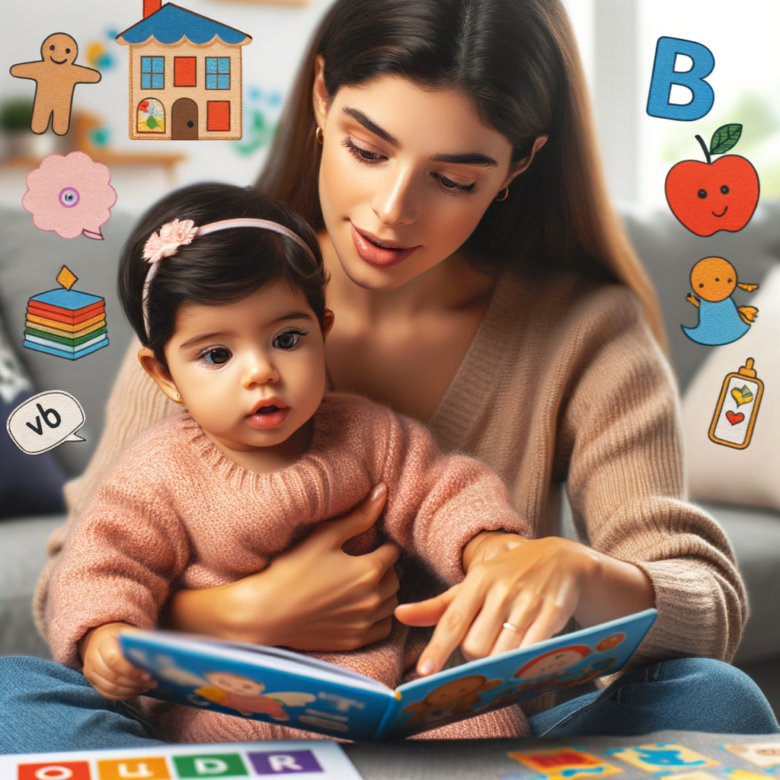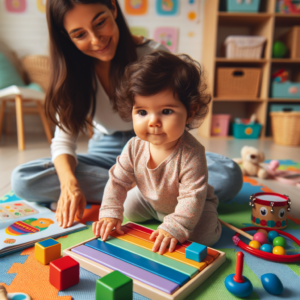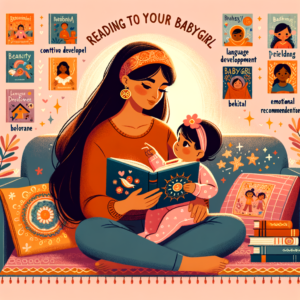Language development is a crucial aspect of your babygirl’s cognitive growth. From her first coos to her first words, every sound she makes is a step towards mastering communication. This comprehensive guide will help you understand the stages of language development and provide strategies to encourage your babygirl’s early communication skills.
Stages of Language Development
Understanding the typical stages can help you track your babygirl’s progress and know what to expect:
0-3 Months:
- Cries differently for different needs
- Coos and makes pleasure sounds
- Smiles at the sound of your voice
4-6 Months:
- Babbles and makes gurgling sounds
- Uses her voice to express joy and displeasure
- Responds to changes in your tone of voice
7-12 Months:
- Babbles using long and short groups of sounds
- Uses gestures to communicate (waving, reaching)
- Responds to simple verbal requests
- Says “mama” and “dada”
1-2 Years:
- Says several single words
- Uses simple phrases (e.g., “more milk”)
- Follows simple commands
- Points to named objects
Strategies to Encourage Language Development
- Talk, Talk, Talk
- Narrate your daily activities
- Describe what you’re doing, seeing, and feeling
- Use simple, clear language
- Read Together Daily
- Choose board books with simple pictures
- Point to and name objects in the book
- Make reading an interactive experience
- Sing Songs and Nursery Rhymes
- Use gestures and actions with songs
- Encourage your babygirl to join in
- Repetition helps reinforce language patterns
- Respond to Your Babygirl’s Attempts at Communication
- Acknowledge and expand on her babbles and gestures
- If she points to a ball, say “Yes, that’s a red ball”
- Use Gestures Along with Words
- Wave while saying “bye-bye”
- Point to objects as you name them
- Play Language Games
- Simple games like peek-a-boo encourage turn-taking in communication
- Name body parts during diaper changes or bath time
- Limit Screen Time
- Prioritize face-to-face interaction
- If using screens, watch together and discuss what you see
- Encourage Imitation
- Make animal sounds and encourage your babygirl to copy
- Use exaggerated facial expressions and wait for her to mimic
- Create Opportunities for Communication
- Put favorite toys slightly out of reach to encourage asking
- Offer choices: “Do you want the red cup or the blue cup?”
- Use Positive Reinforcement
- Praise her attempts at communication
- Show excitement when she uses new words or gestures
Language Development Red Flags
While every child develops at their own pace, be aware of these potential red flags:
- No babbling by 9 months
- No gesturing (pointing, waving) by 12 months
- No single words by 16 months
- No two-word phrases by 24 months
- Loss of previously acquired language skills
If you notice any of these signs, consult with your pediatrician.
Bilingual Language Development
If you’re raising your babygirl in a bilingual household:
- Consistency is key – use the same language patterns regularly
- Don’t worry about confusion – babies can differentiate between languages
- Expect some language mixing – this is normal and temporary
- Remember that bilingual children may say their first words slightly later, but catch up quickly
Frequently Asked Questions
Q: Should I use baby talk with my babygirl? A: While using a warm, high-pitched tone can engage babies, it’s best to use correct words and pronunciations.
Q: My babygirl is 18 months and only says a few words. Should I be concerned? A: Every child develops differently. If you’re concerned, consult your pediatrician.
Q: How can I encourage my babygirl to say her first words? A: Continue talking, reading, and singing. Label objects frequently and respond positively to her communication attempts.
Q: Is it okay to introduce sign language to my babygirl? A: Yes, simple signs can help reduce frustration and encourage communication before verbal skills develop fully.
Conclusion
Language development is a fascinating journey that begins from the moment your babygirl is born. By providing a rich language environment and responding positively to her communication attempts, you’re laying the foundation for strong language skills.
Remember, every babygirl develops at her own pace. The most important things you can provide are love, patience, and plenty of opportunities for communication. Celebrate each milestone, no matter how small, and enjoy the wonderful process of watching your little one learn to express herself.
As you embark on this language journey with your babygirl, remember that you are her most important language teacher. Your words, your responses, and your encouragement will shape her communication skills for years to come. Embrace this role with joy and enthusiasm, and watch in wonder as your babygirl discovers the power of language!



